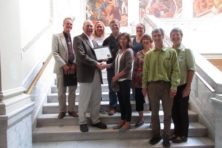Federal Funding for Granary Pending Historic Review
- Share
- Tweet
- Pin
- Share

The Door County Granary project has another hurdle to clear.
Project manager Nicole Matson told the Sturgeon Bay Common Council Sept. 19 that it will need to undergo a State Historic Preservation Office (SHPO) review before it can receive $3.3 million in congressionally directed spending.
She said the review is required because the 1901 Teweles and Brandeis grain elevator on Sturgeon Bay’s West Waterfront is listed on the National and State Register of Historic Places.
To complete the review, Matson said design plans and project history were submitted to SHPO on Sept. 8. She said she’s confident the organization will give its stamp of approval in a timely manner.
“Compliance with national and state preservation guidelines is one of the main principles driving the designs and plans to rehabilitate and repurpose the Teweles and Brandeis grain elevator,” Matson said. “As such, we’re confident that the SHPO review will proceed smoothly.”
Congress earmarked the money last December, and the Sturgeon Bay Historical Society Foundation (SBHSF), which previously entered into a development agreement with the city to restore the Granary, is awaiting that federal funding before bidding out the project and proceeding with construction.
Matson said the SBHSF is proceeding to finalize the requirements of its application with the U.S. Department of Agriculture’s (USDA) Rural Development to receive the funds, and the project will be ready to go to bid “when the USDA gives us the green light to begin construction.”
When asked by District 7 Alderwoman Kirsten Reeths what the SBHSF plans to do if it doesn’t receive the federal funding, Matson said, “We’ll cross that bridge when we get to it.”
If funds are awarded this fall, Matson said the Granary’s restoration to open the building to the public should be completed next summer.
Tom Heinrich, the vice president of operations for Greenfire, the Granary’s construction manager, said construction plans will go out for bidding as soon as the federal funding is obligated for the project.
Heinrich said it would be possible to adjust the project design to bring down costs, if the bids received exceed $3.3 million
“Usually there’s ways to do that that still completes the project with the original intent in mind,” he said. “We’ve been working on what some of those backup plans are in case that does happen.”
Heinrich said he estimates work on the Granary’s restoration would take six to eight months.
The development agreement’s last extension to “substantially complete” the project expired at the end of April, and the SBHSF and the city have been in discussions to extend the agreement.





